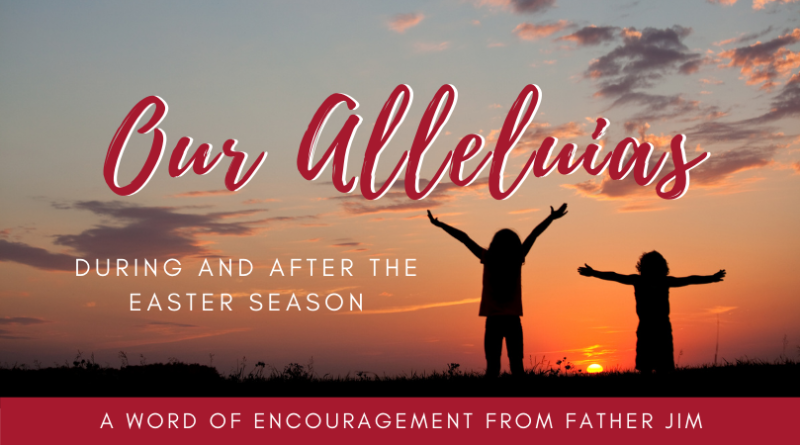Our Alleluias
Dear Sisters and Brothers in Christ,
The word “Alleluia” literally means “Praise God!” This word has been found in numerous Psalms as well as other books in the Bible. It’s interesting to note that “Alleluia” has been inserted into a number of modern secular songs, for example, “Hallelujah” (the Hebrew form of Alleluia) by Rufus Wainwright, used in the movie Shrek.
This praise-word is often used in our Anglican/Episcopal worship services of Holy Eucharist and the Daily Office (Morning and Evening Prayer, Noonday Prayer, and Compline). At Holy Eucharist, it MAY (but usually is) used at the Celebrant’s invitation to Holy Communion: “Alleluia! Christ our Passover is sacrificed for us!” to which the people respond “Therefore, let us keep the feast, Alleluia!”
“Alleluia” (or “Hallelujah”) has been associated with our celebration of Easter, since we praise God in a special way for the great miracle of Jesus’ Resurrection from the dead, signifying Christ’s power over sin and death and the promise of a like resurrection for those who accept God’s grace. In the Church, it was used primarily at the Easter Vigil and Easter Day services, but later extended throughout the 50-day Season of Easter, which ends this Sunday at Pentecost. During Easter Season Holy Eucharists, we have some special opportunities to sing or shout “Alleluia!”:
- At the Opening Acclamation, after the Celebrant says, “Alleluia! Christ is Risen!” to which we respond, “The Lord is Risen indeed, Alleluia!”
- Before the Gospel, where an “Alleluia” may be sung in place of the Sequence Hymn
- At the invitation to Holy Communion
- At the deacon’s (or priest’s) Dismissal: “Go in peace to love and serve the Lord, Alleluia, Alleluia!” (or similar words), to which we respond, “Thanks be to God, Alleluia, Alleluia!”
This Sunday, the Day of Pentecost, marks the end of the 50-day Season of Easter, where Jesus’ promise to have God send the Holy Spirit upon the Apostles is fulfilled. This will be the last time that our deacons and congregation will shout “Alleluia, Alleluia!” at the dismissal until next year’s Easter Vigil (Saturday, April 8, 2023). I know that there are some churches where a few people will continue to recite or sing “Alleluia, Alleluia” during the dismissal after the Easter Season has ended. Although they probably have good intentions, they are not giving a common response — which should be “Thanks be to God” once our 50-day celebration is over. I’m not the “liturgical police;” however, our worship of God in Christ through the Holy Spirit calls us, for the most part, to give a unified response as the people of God. (One exception is the call for personal prayer intentions during the Prayers of the People.) So, when we say or sing “Alleluia, Alleluia” during the Easter Season dismissal, we do this together as the Congregation. On Trinity Sunday through the following Maundy Thursday, we reserve those Alleluias (as well as those at the beginning of the Eucharist) until Easter Vigil/Day and Season, when we celebrate Christ’s Resurrection in a special way.
Thank you for reading this article! I would appreciate your comments. Please know that as we worship God as a Community in Christ, our Abba/Heavenly Parent hears our prayers, because they are unified with Jesus’s ongoing prayer through the power of the Holy Spirit. So, I can safely tell you (at least through Pentecost Sunday): “Let us bless the Lord, Alleluia, Alleluia!” and I hope your response will be “Thanks be to God, Alleluia, Alleluia!”
Fr. Jim Bernacki+

